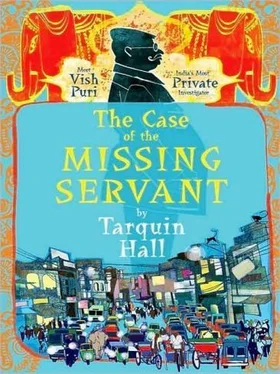Tarquin Hall - The Case of the Missing Servant
Здесь есть возможность читать онлайн «Tarquin Hall - The Case of the Missing Servant» весь текст электронной книги совершенно бесплатно (целиком полную версию без сокращений). В некоторых случаях можно слушать аудио, скачать через торрент в формате fb2 и присутствует краткое содержание. Год выпуска: 2009, ISBN: 2009, Издательство: Simon & Schuster, Жанр: Детектив, на английском языке. Описание произведения, (предисловие) а так же отзывы посетителей доступны на портале библиотеки ЛибКат.
- Название:The Case of the Missing Servant
- Автор:
- Издательство:Simon & Schuster
- Жанр:
- Год:2009
- ISBN:978-1-4165-8402-5
- Рейтинг книги:3 / 5. Голосов: 1
-
Избранное:Добавить в избранное
- Отзывы:
-
Ваша оценка:
- 60
- 1
- 2
- 3
- 4
- 5
The Case of the Missing Servant: краткое содержание, описание и аннотация
Предлагаем к чтению аннотацию, описание, краткое содержание или предисловие (зависит от того, что написал сам автор книги «The Case of the Missing Servant»). Если вы не нашли необходимую информацию о книге — напишите в комментариях, мы постараемся отыскать её.
The Case of the Missing Servant — читать онлайн бесплатно полную книгу (весь текст) целиком
Ниже представлен текст книги, разбитый по страницам. Система сохранения места последней прочитанной страницы, позволяет с удобством читать онлайн бесплатно книгу «The Case of the Missing Servant», без необходимости каждый раз заново искать на чём Вы остановились. Поставьте закладку, и сможете в любой момент перейти на страницу, на которой закончили чтение.
Интервал:
Закладка:
The detective drank to his client's health but looked troubled.
"Too much soda?"
"No, no, badiya!"
"Something is wrong?"
"Yes, there is something," answered Puri. "Before I proceed further, one thing should be understood. A detective must be thorough. He must leave no stone unturned. To reach the truth, he must go about where he's not wanted, asking questions people don't want to answer. He must pry into the darkest shadows. Sometimes he will discover skeletons hiding away in closets. Sometimes in trunks, also."
"You've found something already, Puri-ji?"
"Nothing yet. But this is an old friend." He touched the side of his bulbous Punjabi nose. "It is as good as radar. Better, in fact! And it is telling me something terrible has happened. The circumstances surrounding Mary's disappearance are most peculiar. No way a maidservant leaves without taking her salary. However small an amount, such a female will want it."
The detective stared into his whisky, deep in thought.
"If you want me to find out what happened, I must examine your affairs and those of your family. From top to bottom, inside and out."
"We have nothing to hide," said Kasliwal.
Puri drained his glass and placed it on his client's desk. His countenance was grave. "Let us suppose for a moment you were making mischief with this Mary," he said.
Kasliwal sat up straight. "What kind of question is that?"
"Sir, I need to know everything or no good will come," answered Puri, staring at him across the desk.
"Nothing happened between us, I swear it."
"But you tried to make friendship with her?"
"Listen, I admit she was good for window shopping, but I never touched her. My father taught me never to do hanky-panky with servants."
"And with others?" probed Puri.
The lawyer stood up, looking agitated. He started to pace up and down.
"Sit. It is no good hiding the truth from Vish Puri," prompted the detective.
"My private life is not open for discussion," said Kasliwal firmly.
"Sir, I'm working on your behalf. What is said will remain between us."
Kasliwal stopped by the window of his office looking out on the inner courtyard of the High Court. There was a long silence and then he turned his back on the window and said, "I admit I'm not a man to always eat home-cooked food. Sometimes, I like something extra spicy."
His words were met with a blank look.
"Come on, Puri-ji, you know how it is. I'm only human. Married to the same woman for twenty-nine years. Arranged marriage and all. After so many innings, a man needs some extracurricular activity."
"But not with servants?"
"Life is complicated enough, Puri-ji."
The detective took out his notebook, referring to his notes from his conversation with Mrs. Kasliwal.
"How about Kamat, cook's assistant? He and Mary got involved?"
Kasliwal shrugged. By now, he was standing with his hands on the back of his chair, leaning over it. "I wouldn't know. With so much workload, I'm not around the house much."
Puri flicked back to the notes taken during his first conversation with his client in the Gymkhana Club.
"The night Mary vanished, you were working, is it?" he asked.
The lawyer looked down and exhaled deeply. "Not exactly," he confessed. "I was…"
"Making friendship?"
There was a pause. "Something like that."
"Anyone can verify?"
Kasliwal looked torn by the suggestion. "Puri-ji, that could be awkward," he said hesitantly.
The detective referred to the list compiled by Mrs. Kasliwal of everyone who was supposed to have been in the house at the time of Mary's disappearance.
"What about your driver, Munnalal? He was with you?"
"He dropped me at the address, yes."
"I'd like to talk with him."
"I'm afraid one month back, he got drunk and abusive, so I fired him."
"You know his address?"
"No, but he's round about. I pass him in one of those new Land Cruisers from time to time. Must be working for another family. I doubt it will be difficult to track him down."
The detective checked his watch. It was already four o'clock.
"By God, where does the time go? I'd better get a move on, actually," he said.
Kasliwal saw him to do the door.
As they shook hands, Puri asked, "Sir, is your wife aware?"
"Of what? Munnalal's address? Possibly I can ask her."
"I was referring to your like of spicy food."
Kasliwal raised a knowing eyebrow and replied, "I never bring home takeout."
After he left the High Court, Puri asked Handbrake to take him to a hole-in-the-wall cash dispenser, where he took out a wad of new hundred-rupee notes.
Their next stop was Jaipur's Central Records Office, where the detective wanted to check if any unidentified bodies had been discovered in Jaipur around the time of Mary's disappearance.
The building matched the blueprint for most Indian government structures of the post-1947 socialist era: a big, uninspiring block of crumbling, low-quality concrete with rows of air-conditioning units covered in pigeon excrement jutting from the windows.
At the entrance stood a walk-through metal detector that looked like a high school science project. Made out of chipboard and hooked up to an old car battery, it beeped every ten seconds irrespective of whether anyone passed through it.
The foyer beyond was dark with a half-dead potted plant on either side of the lift and several panels hanging precariously from the false ceiling. Two busybody male receptionists sat at a wooden desk cluttered with rotary-dial telephones and visitors' logbooks. A sign on the wall behind them read:
Puri did not have an appointment and, since he could not lay claim to being any of the above, had to part with a few minutes of his time and three of his new hundred-rupee notes.
Thus armed with the requisite entry chit, all properly signed and rubber-stamped, the detective made his way up the stairs (the lift was undergoing construction), passing walls streaked with red paan spit and fire buckets full of sand and cigarette and bidi butts.
On the fourth floor, little men with oiled hair wearing the semiofficial uniform of the Indian bureaucratic peon-grey polyester pant suits with permanent creases, and black shoes-made their way up and down the corridor. Coming face-to-face with the sheer size of the Indian bureaucracy never failed to amaze Puri. The system still employed hundreds of thousands of people and, despite the recent rise of the private sector, it remained the career of choice for the vast majority of the educated population.
Puri doubted this would change any time soon. India's love of red tape could be traced back centuries before the British. The Maurya Empire, India's first centralized power, which was founded around 2300 BC and stretched across most of the north of the subcontinent, had had a thriving bureaucracy. It had been a uniting force, implementing the rule of law and bringing stability. But now, the endemic corruption in India's administration was severely hampering the country's development.
Room 428 was near the far end of the corridor. As he strode purposefully inside, Puri took his fake Delhi police officer badge from his wallet, adopting the role of Special Commissioner Krishan Murti, Delhi Crime Branch. At the counter where all requests for records had to be made, he told the clerk that he wanted to see the file for unclaimed bodies found in Jaipur in August.
Читать дальшеИнтервал:
Закладка:
Похожие книги на «The Case of the Missing Servant»
Представляем Вашему вниманию похожие книги на «The Case of the Missing Servant» списком для выбора. Мы отобрали схожую по названию и смыслу литературу в надежде предоставить читателям больше вариантов отыскать новые, интересные, ещё непрочитанные произведения.
Обсуждение, отзывы о книге «The Case of the Missing Servant» и просто собственные мнения читателей. Оставьте ваши комментарии, напишите, что Вы думаете о произведении, его смысле или главных героях. Укажите что конкретно понравилось, а что нет, и почему Вы так считаете.












